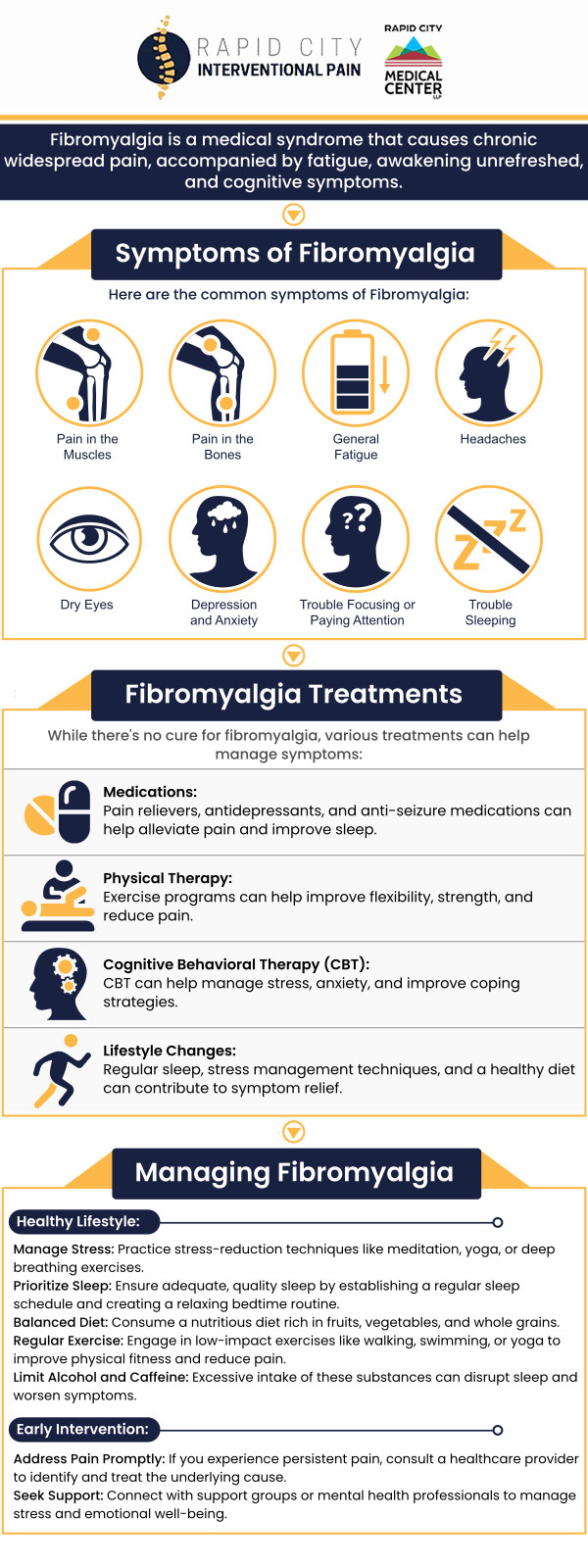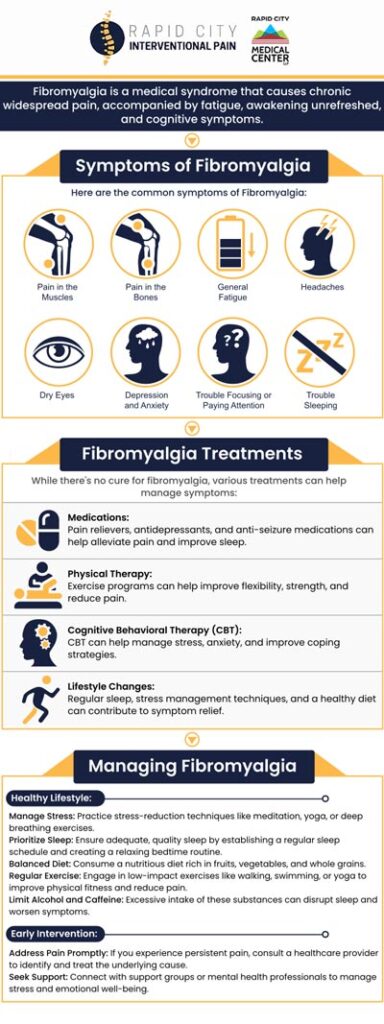Fibromyalgia Treatment Specialist in Rapid City, SD
Fibromyalgia treatment with Dr. Lance Doeden and Dr. Tyler Ptacek at Rapid City Interventional Pain focuses on personalized care to manage pain, fatigue, and other symptoms. Our comprehensive approach includes medication, therapies, and lifestyle adjustments to improve your quality of life. For more information, contact us or book an appointment online. We are conveniently located at 101 E Minnesota St. Rapid City, SD 57701.


Table of Contents:
What is Fibromyalgia, and how is it diagnosed?
What are the common symptoms of Fibromyalgia?
What causes Fibromyalgia pain?
How is Fibromyalgia treated?
Fibromyalgia is a chronic condition that causes widespread musculoskeletal pain, fatigue, and cognitive difficulties, commonly known as “fibro fog.” It affects a significant portion of the population, with a higher prevalence among women. The condition alters the brain and spinal cord’s processing of pain, intensifying painful sensations.
Symptoms typically include deep, persistent pain on both sides of the body, along with tenderness at specific points known as “tender points.” Other symptoms may involve fatigue, sleep disturbances, cognitive impairments, headaches, digestive issues, and anxiety or depression.
The exact cause of fibromyalgia remains unclear, but it is believed to involve a combination of genetic, environmental, and psychological factors. Stress, infections, or physical trauma can trigger the onset of symptoms in vulnerable individuals.
Diagnosing fibromyalgia involves a comprehensive evaluation, as there are no specific tests to confirm the condition. Medical professionals assess symptoms, and medical history, and conduct a physical exam to evaluate tender points, typically located on the neck, shoulders, back, hips, and knees. To differentiate fibromyalgia from similar conditions like rheumatoid arthritis or lupus, blood tests or imaging studies may be used.
A diagnosis is typically based on criteria such as widespread pain lasting more than three months, along with an evaluation of fatigue, unrefreshing sleep, and cognitive symptoms.
The goal of treatment for fibromyalgia is to provide individualized strategies to manage pain and improve overall quality of life. A holistic approach, including lifestyle changes and various therapeutic interventions, is key to managing the condition effectively.
Fibromyalgia is a complex and often misunderstood condition that requires a comprehensive and individualized approach to management. It is characterized by persistent, widespread musculoskeletal pain, along with associated symptoms such as fatigue, cognitive difficulties known as “fibro fog,” and sleep disturbances.
Recognizing that each person’s experience with fibromyalgia is unique, treatment plans should be personalized to address specific symptoms and challenges. These plans may include a combination of interventional techniques, medication management, and integrative therapies designed to relieve pain and improve quality of life.
For individuals with frequent and severe headaches, targeted interventions can help reduce the frequency and intensity of headaches, improving daily functioning. Additionally, support may be provided for managing related conditions such as irritable bowel syndrome (IBS) and other gastrointestinal issues, which often accompany fibromyalgia.
Chronic pain can also have a significant emotional and psychological impact, leading to mood changes like depression and anxiety. A holistic approach is essential, and treatment may include counseling or referrals to mental health professionals to address these emotional challenges.
The goal of treatment is to empower individuals with the resources and tools they need to manage fibromyalgia effectively. By providing compassionate care, advanced treatments, and ongoing support, patients can improve their overall well-being and quality of life while navigating the complexities of this condition.
Fibromyalgia is a complex condition characterized by widespread pain, fatigue, sleep disturbances, memory issues, and mood problems. Its multifaceted nature involves a combination of genetic, neurological, hormonal, and environmental factors, all of which contribute to its impact on daily life.
Neurological interventions focus on central sensitization, where the brain and spinal cord’s processing of pain signals is altered, amplifying pain. Treatments are tailored to reduce the increased pain-signaling chemicals, helping to alleviate persistent discomfort.
Genetic factors are believed to play a role in fibromyalgia, though specific genes have yet to be identified. Family history and genetic susceptibility are considered when developing personalized treatment plans to ensure effective care.
Hormonal imbalances, particularly involving neurotransmitters like serotonin and norepinephrine, are thought to contribute to fibromyalgia’s higher prevalence in women. Addressing these imbalances is essential in improving pain perception and modulation.
Environmental and trauma-related triggers are also important, as fibromyalgia symptoms often emerge after stressful events or exposures. By identifying and managing these triggers, treatments aim to reduce their impact on the condition.
A holistic approach that addresses these various factors is essential for managing fibromyalgia and improving overall quality of life. Each treatment plan is customized to meet individual needs and help alleviate symptoms effectively.
Fibromyalgia is treated through a multifaceted approach aimed at managing symptoms and improving quality of life, as there is no known cure. Treatment plans are tailored to the severity of symptoms and individual needs.
In addition to medication, interventional pain management techniques can be effective for some individuals. These may include injections to reduce inflammation, botulinum toxin injections to disrupt pain pathways, and nerve stimulation therapies to interrupt chronic pain signals.
Holistic therapies such as acupuncture, yoga, Tai Chi, and relaxation techniques like meditation and deep breathing exercises can also be beneficial in managing fibromyalgia by promoting relaxation, flexibility, and balance.
Lifestyle changes are crucial for managing the condition. Establishing consistent sleep routines, eating a balanced diet, maintaining a healthy weight, and engaging in regular, low-impact exercise are all key factors in symptom management. Support groups and counseling can provide emotional support and reduce feelings of isolation.
A comprehensive and personalized approach to treatment is essential for helping individuals manage fibromyalgia and improve their overall quality of life. For more information, contact us or book an appointment online. We are conveniently located at 101 E Minnesota St. Rapid City, SD 57701. We serve patients from Rapid City SD, Rapid Valley SD, Black Hawk SD, Box Elder SD, and surrounding areas.

Additional Services You May Need
▸ Back Pain Treatment
▸ Neck Pain Treatment
▸ Joint Pain Treatment
▸ Nerve Pain Treatment
▸ Degenerative Disc Disease
▸ Arthritis Pain Treatment
▸ Diabetic Neuropathy Treatment
▸ Headaches Treatment
▸ Shoulder Pain Treatment
▸ Hip Pain Treatment
▸ Spinal Cord Stimulator
▸ Complex regional pain
▸ Knee Pain Treatment
▸ Sciatica Pain Treatment

Additional Services You May Need
▸ Back Pain Treatment
▸ Neck Pain Treatment
▸ Joint Pain Treatment
▸ Nerve Pain Treatment
▸ Degenerative Disc Disease
▸ Arthritis Pain Treatment
▸ Diabetic Neuropathy Treatment
▸ Headaches Treatment
▸ Shoulder Pain Treatment
▸ Hip Pain Treatment
▸ Spinal Cord Stimulator
▸ Complex regional pain
▸ Knee Pain Treatment
▸ Sciatica Pain Treatment



